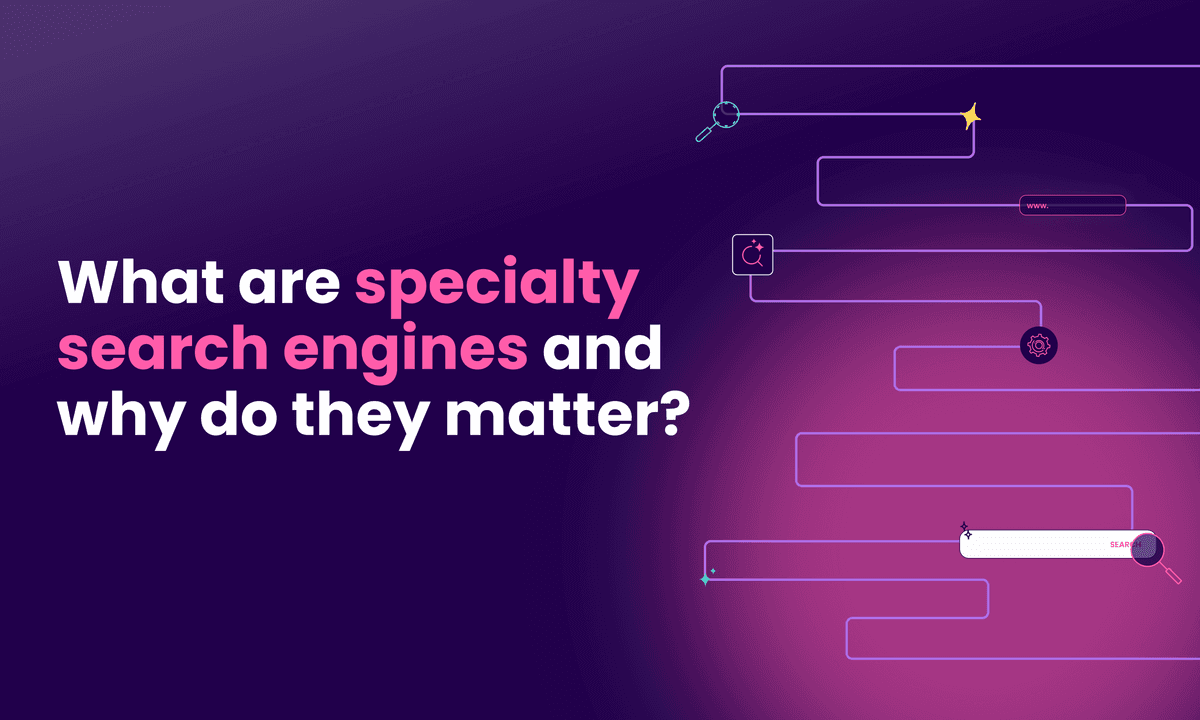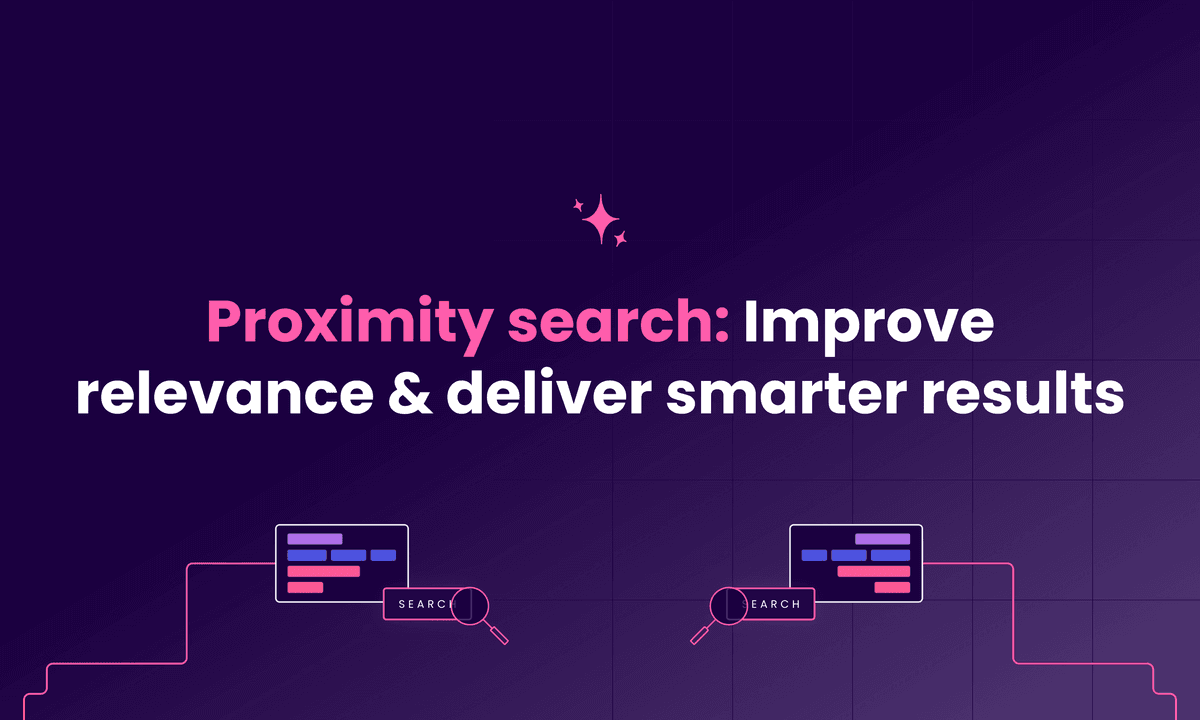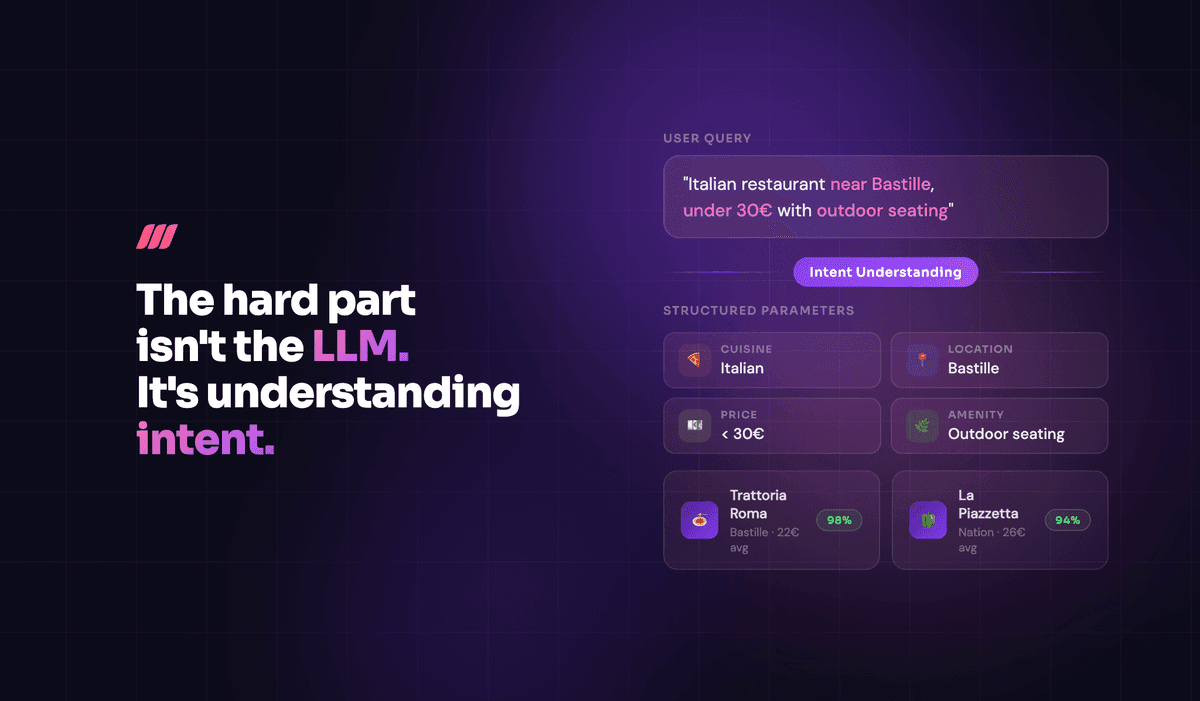10 of the best Azure AI search alternatives in 2026
Discover and compare alternatives to Azure AI Search alongside pros & cons based on real user reviews and choose the best for your needs.
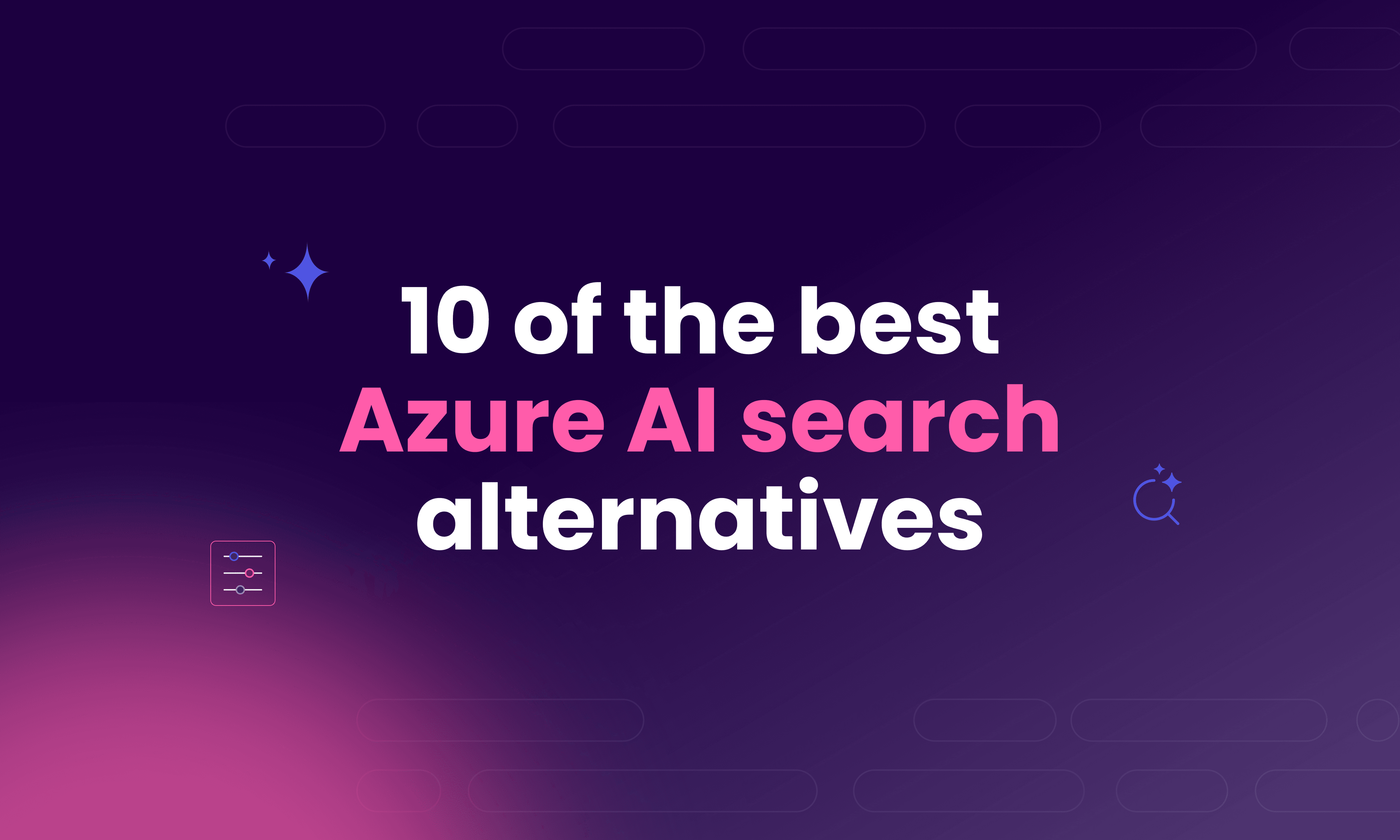
In this article
Azure AI Search (previously known as Azure Cognitive Search) is an AI-powered search system tailored for enterprises looking for fast information retrieval.
Alternatives to Azure AI Search are tools that provide flexibility regarding integrations outside the Microsoft ecosystem. They are also easy to use and faster, among other key perks.
Some of the best Azure AI Search alternatives are Meilisearch, Elasticsearch, Qdrant, and others.
To choose the best alternative to Azure AI Search, you should consider the following features in the table below:

Why do people switch from Azure AI Search?
While Azure AI Search offers diverse pricing plans, the high costs seem to be the major drawback highlighted by customer reviews on G2.
Starting can also be overwhelming for less technical users, and information retrieval is not always ideal due to a lack of infrastructure updates and latency.
Here’s what the G2 reviewers said:
- Raja S. says, “High costs for large-scale use. Complex pricing plans.”
- Ankit P. says, “One downside of Azure AI Search is that its advanced features require detailed configuration, which may be overwhelming for less technical users.”
- Klaus Wilhelm K. says, “One limitation is the difficulty of updating existing indexes in some cases, which can disrupt workflows.”
- “The pricing structure can be restrictive for smaller teams or individual developers, as it quickly adds up with higher usage tiers.”
The alternatives may be unable to fix all Azure AI Search issues simultaneously, so we present 10 competitors, from which you can choose depending on your company's needs.
Let’s explore them all.
1. Meilisearch
Meilisearch is an open-source, lightning-fast search engine designed for developers and enterprises seeking to embed intuitive, scalable search experiences into applications through its RESTful API. Focusing on simplicity and performance, it provides advanced features such as typo tolerance, faceted search, and synonym support.

Meilisearch’s Cloud
Source: https://www.meilisearch.com/cloud
Key features:
- Typo tolerance and instant search: Automatically corrects typos and delivers results as users type, reducing friction for end-users.
- Customizable ranking rules: Provides built-in and custom ranking rules. The latter allows for the fine-tuning of search relevance depending on the application.
- Developer-first API: RESTful endpoints and SDKs for popular languages (JavaScript, Python) streamline integration, reducing development time.
- Faceted search: Enables users to refine search results using broad categories or facets, providing an intuitive way to filter content and quickly locate results that meet their specific needs.
- Multi-language support: It works with languages that use whitespace to separate words and languages with different writing systems (such as Chinese, Japanese, and Thai).
Pricing:
Meilisearch offers three pricing plans and a free version:
- Build: Starting at $30/month for up to 100k documents and 50k searches included.
- Pro: Starting at $300/month for up to 1M documents and 250k searches included.
- Custom: Meilisearch offers a custom plan with volume-based pricing discounts.
Integrations:
Meilisearch natively supports JavaScript, Python, Java, PHP, Golang, Swift, Rust, Dart, and .NET, as well as frameworks like Rails, Laravel, and Symfony. It also offers convenient plugins for Gatsby, Firebase, VuePress, and Strapi. For DevOps, integration tools are available for AWS, DigitalOcean, Kubernetes, and GCP.
Pros:
Based on G2 reviews, real users praise its speed, support, and easy setup:
- Speed: “Performance-wise, I'm impressed by the speed of indexing our data, as we sometimes republish all our assets at once.”
- Support: “I’ve also had a really good experience with their support team. They’re quick to respond and genuinely helpful, which makes a big difference when you’re troubleshooting or trying to get something specific to work.”
- Setup: “Its seamless integration with our systems has positively impacted developer experience, making its integration with our platform, local environment setup, testing, and CI/CD automation significantly more efficient.”
Cons:
Customers would like to see some improvement in the new dashboard feature. These are some reviews taken from G2:
- “Overall, it's still improving, but the admin dashboard sometimes lacks clarity.”
- “One thing I think could be improved is the dashboard. While it works fine for basic needs, it could be a bit more sophisticated with additional features or tools to manage indexes more effectively.”
Best for:
- Developers: Ideal for teams building custom apps needing lightweight, scalable search.
- Startups: Cost-effective for e-commerce, SaaS platforms, or documentation hubs.
- Tech-first enterprises: Suits companies prioritizing speed and control via open-source solutions with fast and secure authentication.
Why choose Meilisearch:
Meilisearch facilitates the integration of AI-driven search engines with a well-documented RESTful API or through Meilisearch Cloud. Information retrieval is lightning-fast, typo-tolerant, and accurate.
For businesses focused on driving measurable outcomes, Meilisearch delivers tangible results. One e-commerce platform saw a dramatic boost in customer satisfaction and revenue after switching:
“With Meilisearch, we achieved a 43% improvement in purchase conversion compared to our previous search engine. Now, 1 out of 5 customers easily find and purchase the book they were looking for.” — Andy Hunter, CEO at Bookshop.org.
Get started with Meilisearch's RESTful API today and enjoy a 14-day free trial
2. Elasticsearch
Elasticsearch is an open-source, distributed search and analytics engine with a scalable data store and vector database for various use cases. As the core of the Elastic Stack, it provides centralized data storage, enabling ultra-fast searches, precise relevancy tuning, and robust analytics.

It adopts a document-oriented approach where JSON documents replace traditional tables and schemas, allowing for flexible data organization and retrieval. With its robust RESTful APIs, Elasticsearch handles data storage and search operations seamlessly.
Key features:
- Distributed and scalable: Designed for high availability, Elasticsearch distributes data across multiple nodes using sharding and replication.
- Real-time search and analytics: Elasticsearch processes and indexes ingested data, providing instant search and analytics capabilities.
- RESTful API: Elasticsearch offers a comprehensive RESTful API for interacting with the cluster, including indexing, querying, updating, and managing documents.
Pricing:
- Standard: From $95/month. Includes Elastic Stack features, Kibana Lens, Elastic Maps, Canvas & more.
- Gold: From $109/month. Everything in Standard plus reporting, multi-stack monitoring, enhanced security & support.
- Platinum: From $125/month. Everything in Gold plus advanced security, Machine Learning & more.
- Enterprise: From $175/month. Everything in Platinum plus premium support, Elastic Maps Server & more.
Integrations:
Elasticsearch integrates with Kibana for visualization, Logstash/Beats for data ingestion, and cloud platforms like AWS, Azure, and GCP. Pre-built connectors for databases (PostgreSQL, MongoDB) and tools like Salesforce streamline data unification.
Pros:
Customers on G2 reviews highlight its speed, data handling, and accuracy:
- Speed: “Faster search responses are the best thing we like.”
- **Data handling: ** “It is extremely efficient to unify all data sources across the organization for improved search and organization.”
- Accuracy: “Provide accurate results [for] what we are looking for in the search.“
Cons:
Users in G2 reviews mention its difficulty in setting up and configuring:
- “Initial setting up needs prior experience, or else you would need to spend more time understanding its proper configuration methodologies.”
- “It can be cumbersome to install and configure, especially for those unfamiliar with Elastic.”
Best for:
- DevOps/IT teams: Critical for log analytics and infrastructure monitoring.
- Data-driven enterprises: Support retail, fintech, and healthcare use cases requiring real-time insights.
Why choose Elasticsearch:
Through its unified data storage solution, Elasticsearch allows for fast information retrieval across several nodes. It also comes with multiple integrations and extensive documentation to use this hassle-free search alternative.
3. Qdrant
Qdrant is an open-source vector database and vector search engine built in Rust. It efficiently handles similarity searches on high-dimensional vectors, making it ideal for tasks like recommendation systems, semantic search, and anomaly detection.

You can use its API to store, search, and manage vectors and add additional information (payloads) in JSON format to create dynamic datasets.
Key features:
- High-Performance vector search: Utilizes HNSW algorithm and Rust optimizations for low-latency queries.
- Payload filtering: Combines metadata filtering with vector search for precise results.
- Real-time updates: Enables live data ingestion without downtime.
Pricing:
- Free Tier: Self-hosted version (no cost) and Qdrant Cloud (1GB storage).
- Hybrid Cloud: Starting at $0.014 per hour. You can integrate other cloud solutions while preserving security and speed.
- Custom: Price on request. All benefits in the Hybrid Cloud and a premium support plan.
Integrations:
Qdrant integrates with popular AI tools like LangChain and third-party platforms like Apify, Bubble, Make, and N8N. It offers native client libraries for Python, Rust, Go, JavaScript, and others.
Pros:
Customers on G2 highlight its easy setup and integration:
- Setup: “Qdrant worked the best. The setup on our server was super easy, and their documentation is very elaborate.”
- Integration:* “The ease of integration with AI-based applications and the ability to perform semantic search queries are major advantages.”*
- Speed: “I can quickly scan through huge volumes of vectors—it is relevant for my AI work on image recognition.”
Cons:
Users mention the lack of front-end components on G2, such as dashboards and queries through UI:
- Challenging onboarding: “While the documentation is well-done, more practical examples or video tutorials would be helpful to ease the onboarding process for new users.”
- No UI: “Inability to perform rich operations from UI without writing code/query.”
- No visualizations: “Qdrant does not have integrated visualizations.”
Best for:
- Developers: ML and AI engineers who need to get into deep search engine customizations.
- Enterprises: Requiring hybrid cloud/on-premise vector search solutions.
Why choose Qdrant:
Qdrant offers speed and flexibility, with open-source accessibility and robust scalability. It’s ideal for teams needing a high-performing and customizable engine that supports real-time updates.
4. Algolia
Algolia offers software and tools to help businesses implement efficient, flexible, and insightful search functionalities across their websites and applications.
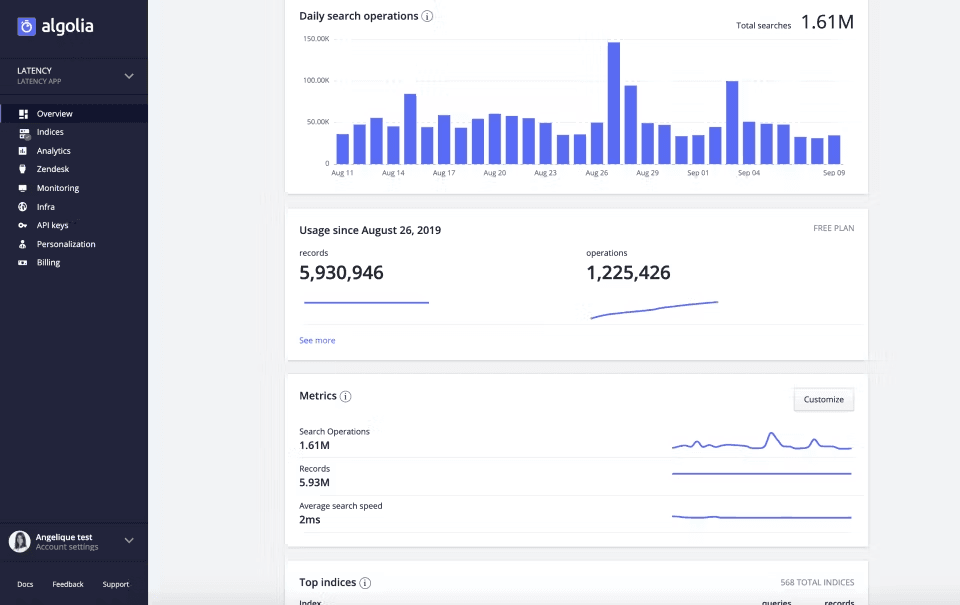
For enterprise search, Algolia provides a robust platform that enables organizations to deliver lightning-fast, accurate search experiences, allowing users to find the exact content they need quickly.
Key features:
- Instant search-as-you-type: Delivers results in milliseconds as users type, with typo tolerance and synonyms.
- Advanced analytics and A/B testing: Provides real-time insights into search performance, enabling teams to optimize relevance and test new configurations without downtime.
Pricing:
Algolia offers flexible pricing plans, and you can decide between annual and pay-as-you-go plans:
- Build: Start for free with up to 10k search requests per month.
- Grow: A pay-as-you-go plan that has the Build features plus a price of $0.50 per 1k additional search requests.
- Premium: Annual plan with AI features, keyword search, and volume discounts.
- Elevate: Everything on Premium plus Neural Search capabilities.
Integrations:
Integrates with Shopify, Salesforce, Adobe Commerce, and popular frameworks like React, Vue.js, and Angular. API support allows custom connections to CRMs, databases, and internal tools.
Pros:
Customers on G2 highlight essential aspects such as collaboration, dashboard features, and support:
- Collaboration:* “It allows for effective collaboration between product, marketing, and engineering teams, streamlining the process of managing search ranking strategies.”*
- Dashboard: “The dashboard is very user-friendly, with many different features.”
- Support: “The customer support is great, and we deployed Algolia in a few hours for our stock.”
Cons:
According to clients, the Algolia dashboard interface can be challenging for beginners to navigate. Additionally, price transparency appears to be a limitation for some users.
- Too many features: “There are so many features that it can seem overwhelming to start at first.”
- Complex pricing plans: “Understanding Algolia’s pricing and how costs scale can sometimes be challenging.”
Best for:
- E-commerce platforms: Enhance product discovery with instant, typo-tolerant search and personalized recommendations.
- Publishers and content platforms: Deliver fast, relevant search experiences for articles, videos, and user-generated content.
- SaaS companies: Improve in-app search for features, documentation, and support resources.
Why choose Algolia:
Algolia has strong data visualization tools that are key to monitoring and making informed decisions based on the user’s input.
In addition, Algolia delivers results in almost real time, making it a fast and robust alternative.
5. AddSearch
AddSearch is a cloud-based, AI-driven website search solution. It combines speed, customization, and advanced analytics.

Its dashboard enables more control over the search results, customizes indexes, and optimizes the overall search experience through insightful charts.
Key features:
- Robust dashboard & analytics: Offers keyword analysis, results management, pinned results, and more with a user-friendly interface.
- Real-time results: Tracks search terms, click-through rates, and no-result queries to refine UX.
Pricing:
Offers three pricing plans and a 14-day free trial:
- Professional: $99 per month. Manage search results, synonyms, and autocomplete.
- Premium: $499 per month. Everything in Professional, plus ranking tools and more personalization.
- Enterprise: On request. Everything in Premium, plus custom commercial terms and multiple search indices.
Integrations:
AddSearch seamlessly integrates with Shopify, WordPress, and Google Analytics.
Pros:
Customers in G2 mention its ease of setup and management:
- Setup: “Setting up and managing AddSearch is easy, it would even be easy for someone with limited technical experience.”
- Support: “The communication with AddSearch customer support is also immediate, personal, and helpful.”
Cons:
- Price: “It's expensive and has no automatic reports.”
- Onboarding: “The onboarding to integrate AddSearch with our site wasn't quite as speedy as the sales process would imply…”
Best for:
- E-commerce stores: Prioritizing product discoverability.
- Content-heavy websites: Blogs, news portals, or documentation hubs.
Why choose AddSearch:
AddSearch simplifies site search implementation while offering robust customization and analytics, making it ideal for businesses that want to enhance user experience without heavy development work.
6. Solr
Apache Solr is an open-source search platform built on Apache Lucene. It is designed to index large datasets and supports complex search use cases, including full-text search, faceted navigation, and analytics.

Solr is a multimodal search platform, meaning it can handle different types of inputs, such as full text and geospatial data.
Key features:
- Scalability: Distributed architecture (Solr Cloud) supports horizontal scaling and fault tolerance.
- Customizable schema: Define field types, tokenization rules, and scoring logic via XML/JSON configurations.
- Multi-modal inputs: Supports full text and geospatial data.
Pricing:
Free to use.
Integrations:
Apache Solr integrates with Apache ecosystems (Hadoop, Spark, Kafka) for data pipelines and connects to SQL/NoSQL databases (MySQL, MongoDB) via connectors. It supports REST APIs and Java, Python, and PHP client libraries.
Pros:
Users in G2 say the following:
- “It's free. No license, big community can help you.”
- “It is very easy to integrate with API.”
- “Ease of use and setup. We can get up and running in 1-2 days for a simple use case.”
Cons:
- Documentation: “It needs [better] documentation and more examples of how to configure and use it.”
- Onboarding: “The naive user facing difficulties in understanding the basics of this tool and also hard to implement in other computer languages.”
Best for:
- E-commerce: Its advanced filtering, faceting, and real-time indexing optimize product discovery for retail.
- Research: Ideal for content-heavy systems requiring precise schema control and multilingual support.
Why choose Solr:
Solr is an open-source and scalable, cost-efficient solution with no licensing fees.
7. Doofinder
Doofinder is a cloud-based search platform that enhances search experiences for e-commerce and content-driven websites.

The platform supports multiple languages, integrates with major e-commerce platforms, and offers visual searching and insightful visualizations.
Key features:
- Visual & voice search: Supports image-based searches (e.g., uploading photos to find similar products) and voice queries.
- Searchandising: Features like pinned results and promotional banners.
- Insightful & real-time analytics: Real-time analytics to track top searches, click-through rates, and missed opportunities.
Pricing:
Doofinder has four pricing plans based on impressions or requests and a 30-day free trial.
- Basic: $39/month with 10,000 requests. Comes with voice search, multi-index, predictive search, and more.
- Pro: $59/month with 10,000 requests. Everything in Basic plus searchandising and more.
- Advanced: $129/month with 50,000 requests—everything in Pro plus visual search, AI personalization, real-time analytics, and more.
- Custom: On request.
Integrations:
Native plugins for Shopify, WooCommerce, Magento, BigCommerce, and more.
Pros:
Customers on G2 highlight the accuracy in the results, the support, and the analytics:
- Analytics: “Another major advantage is the search analytics feature: I use Doofinder extensively to understand what people are looking for on my site.”
- Support: “The support team has been extremely helpful, quick to respond, and approachable whenever questions arise.”
- Accuracy: “Doofinder’s AI-powered search delivers fast, accurate, and highly relevant results, making product discovery seamless for customers.”
Cons:
Customers mention the price limitations for small companies:
- “While Doofinder is excellent overall, one thing that could be improved is the price structure. It’s a bit higher, especially for smaller businesses or those just starting.”
- “The pricing can be a bit high for smaller businesses, and there’s a learning curve when fine-tuning search settings for optimal results.”
Best for:
- E-commerce: Prioritizing product discoverability.
Why choose Doofinder:
Doofinder eases integration with e-commerce plugins and enhances product discoverability with AI-driven features like visual and voice searches.
8. Lucene
Apache Lucene is an open-source search library written in Java.
It is designed for indexing and querying large datasets and is the backbone of search engines like Solr and Elasticsearch.

Lucene powers enterprise search applications, e-commerce platforms, and data analytics tools through its inverted index architecture.
Key features:
- Scalability & performance: The library has frequent updates. The latter implements the ACORN-1 algorithm for pre-filtered vector searches, enhancing speed and performance.
- Query syntax: Comes with its own query language to support users on complex searches.
- Extensibility: Java-native but supports Python via PyLucene.
Pricing:
Free (Apache 2.0 License).
Integrations:
Backbone of Solr and Elasticsearch. Integrates with Hadoop, Spark, and databases via connectors. Available in the Python programming language.
Pros:
Users wrote the following on G2:
- Query language: “Easy implementation and writing/generating Lucene queries are very easy.”
- Indexing: “It is great for indexing and searching.”
- Setup: “Very easy to install and set up. Administration is fairly easy as well.”
Cons:
These are some drawbacks pointed out by the users:
- Not enough manual configurations: “It would have been better to have some more manual configurations.”
- Requires technical expertise: “The Lucene indexes on their own are difficult to maintain and search without experience.”
- Hard setup: “The setup is not trivial for vanilla Lucene. It helps to use something like SOLR or Elasticsearch that sits on top of Lucene to allow for your applications to easily interact with the backend.”
Best for:
- Developers: It’s flexible and extensible for building custom search engines or integrating search into apps.
- Researchers: Offers fine-tuned control over search algorithms.
Why choose Lucene:
Lucene is the pillar of commercial search tools. It’s open-source, flexible, and with proven scalability. While tools like Elasticsearch abstract their complexity, Lucene is ideal for teams requiring low-level control.
9. Amazon Kendra
Amazon Kendra is an AI-powered enterprise search service that allows companies to build intelligent search engines and make Retrieval-Augmented Generation (RAG) systems using the new GenAI index feature.

The service integrates with Amazon Web Services (AWS) data repositories (e.g., S3, RDS) and third-party platforms like SharePoint and Salesforce.
Key features:
- AWS ecosystem integration: Seamlessly integrates with Amazon tools such as Amazon Relational Database (RDS), Amazon Simple Storage Service (S3), Amazon FSx Connector, and Amazon Web Crawler.
- GenAI index for RAG: High-accuracy retrieval in RAG workflows with vector search.
Pricing:
Amazon Kendra comes with three pricing plans:
- GenAI Enterprise Edition: $0.32 per hour. Up to 20,000 documents or 200MB of extracted text.
- Basic Enterprise Edition: $1.4 per hour. Up to 100,000 or 30GB of extracted text.
- Basic Developer Edition: $1.125 per hour. Up to 10,000 documents or 3GB of extracted text.
Integrations:
AWS-native managed services (S3, RDS, Lambda), SaaS tools (Salesforce, SharePoint), and custom connectors via APIs.
Pros:
Customers on Gartner highlight the following perks:
- Amazon integration: “Best part about using AWS Kendra is all our documents were in an S3 bucket, so it wasn't difficult to add the bucket to Kendra settings and start syncing documents by creating an index.”
- Accuracy: “It provides highly accurate and efficient search results that are AI-powered.”
Cons:
These are some limitations pointed out by customers on Gartner:
- Cost: “Kendra is overall expensive. With limitations on several documents imposed for the Community edition, we switched to enterprise, and it's overall expensive.”
- Integrations: “Kendra provides pre-built connections, the library may not include all third-party tools or proprietary systems, necessitating new connector construction.”
Best for:
- Enterprises: Search across internal databases and document repositories.
- Regulated industries: Healthcare, finance, or legal sectors requiring secure search.
- AWS-centric workloads: Organizations already using AWS services.
Why choose Amazon Kendra:
Amazon Kendra simplifies enterprise search for organizations already using AWS and leverages Generative AI to enhance RAG systems within the company.
10. Bloomreach
Bloomreach is a cloud-based e-commerce experience platform and B2B service that combines AI-driven search tools, marketing automation, and content management.

Bloomreach offers RESTful APIs for adding features to both mobile and desktop pages. Additionally, they support API-based feed ingestion to integrate with Bloomreach Search.
Key features:
- Vast e-commerce integrations: Works seamlessly with major e-commerce platforms, such as SAP Hybris, Salesforce Commerce Cloud, BigCommerce, Shopify, and more.
- Personalized experience: Understands user behaviour with Generative AI and uses knowledge from other Bloomreach tools to enhance customer satisfaction.
Pricing:
The Autonomous Search plan price is only available on request.
Integrations:
Bloomreach offers multiple integrations with third-party systems such as Shopify, BigCommerce, Salesforce Commerce Cloud, SAP Hybris, and IBM WebSphere.
Pros:
Customers highlight the following on G2:
- Integration: “I particularly appreciate how it enables smooth integration across various systems and the degree of control it gives over user journeys.”
- Support: “The support team is always fast and extremely helpful, solving almost every problem I have the same day, usually within the hour.”
Cons:
Customers on G2 say that the platform can be counterintuitive at times:
- “Certain functionalities can sometimes feel less intuitive, which might result in inefficiencies during implementation or troubleshooting.”
- “To utilise the full potential, you need to familiarise yourself with the system, as some of the logic is different from what you initially expected.”
Best for:
- Retailers: Managing extensive product catalogs and campaigns.
- Global brands: Needing multi-language SEO and localized content.
Why choose Bloomreach:
Bloomreach excels for large retailers needing a single platform to unify search, merchandising, and cross-channel marketing.
What is the best open-source Azure AI Search?
A good open-source alternative to Azure AI Search should prioritize scalability, developer-friendly APIs, and advanced search features like typo tolerance and faceted search.
It must be community-driven, adaptable to diverse use cases, available in multiple programming languages, and have easy-to-follow documentation.
The best open-source alternatives are:
- Meilisearch: This fully open-source engine offers instant search, typo correction, and customizable ranking rules. It also offers SDKs in several programming languages (e.g., Python, JavaScript, and .NET) and a well-documented API compatible with LangChain and other frameworks.
- Elasticsearch: Excels in distributed search and analytics, backed by a mature open-source ecosystem with several code implementation examples.
- Qdrant: Qdrant is built on Rust, and its open-source version supports high-performance similarity searches and metadata filtering. The Qdrant’s RESTful API supports multiple languages.
Open-source alternatives eliminate licensing costs and offer unparalleled flexibility but require self-managed infrastructure and technical expertise. While tools like Meilisearch simplify onboarding, others like Elasticsearch or Qdrant may require more know-how and time to start building.
What is the best Azure AI Search alternative for e-commerce?
The best Azure AI Search alternative for e-commerce businesses should prioritize fast, accurate product discovery, seamless integration with e-commerce platforms, and features like visual search or personalized recommendations.
The best e-commerce alternatives to Azure AI Search are:
- Meilisearch: Lightning-fast, typo-tolerant search and faceted filtering, critical for extensive product catalogs. For example, Bookshop.org reported a 43% boost in purchase conversions after implementing Meilisearch’s AI search capabilities.
- Doofinder: It stands out with its AI-powered visual and voice search capabilities tailored for e-commerce. Features like “searchandising” (pinned results, promotions) and real-time analytics help businesses refine product visibility.
- Bloomreach: Unified search, content, and marketing tools. Its deep integration with SAP Hybris or Salesforce Commerce Cloud suits e-commerce companies managing complex catalogs.
These alternatives prioritize customization and scalability. Meilisearch provides more integration flexibility, while Doofinder and Bloomreach serve more specific use cases at increased costs.
What is the best Azure AI Search alternative for enterprises?
An ideal enterprise search alternative must deliver scalability, robust security, and seamless integration with existing infrastructure. It should have superior customer support and compliance with industry standards.
The following are the best enterprise alternatives to Azure AI Search:
- Meilisearch: Offers a lightweight, open-source solution with fast search and typo tolerance. Its RESTful API and multi-language support simplify global deployments, while customizable ranking rules ensure precise results. Customers praise its quick setup and easy integration with custom solutions.
- Elasticsearch: Excels for large-scale enterprises requiring distributed architecture and real-time analytics. Its Elastic Stack integration (Kibana, Logstash) supports complex data workflows, from log management to customer-facing search.
- Amazon Kendra: Provides enterprises with GenAI-powered search, which is ideal for RAG systems and internal knowledge bases. It’s a clever choice for large-scale enterprises that use AWS to prioritize security.
These solutions serve modern enterprise search capabilities through Meilisearch's fast and lightweight implementation with outstanding support, Elasticsearch’s scalability and analytics, or Kendra’s Gen-AI search and easy integration with AWS.
What is the best self-hosted Azure AI Search alternative?
For organizations prioritizing data control and infrastructure independence, self-hosted search solutions offer complete ownership of search infrastructure. The ideal self-hosted alternative should provide enterprise-grade performance, straightforward deployment, and robust management tools while maintaining the flexibility to run on-premises or in private clouds.
These are the best self-hosted alternatives to Azure AI Search:
- Meilisearch: Offers easy-to-follow documentation for self-hosting. All you need to do is install Meilisearch on your local machine with a simple curl command and run the instance using a master key. From there, you can add indexes, make a search, or check the status using curl commands or directly with the programming language of your choice.
- Qdrant: It is a self-hosted solution available in multiple programming languages. It allows you to add payloads (extra pieces of information) using JSON format on your company’s machine.
- Solr: Ideal for organizations already familiar with the Apache ecosystem. Its mature codebase handles complex search use cases with features like custom scoring models and rich document processing pipelines. The active open-source community ensures continuous improvements and extensive plugin support.
How do you choose an alternative to Azure AI Search?
Choosing the right search providers requires balancing technical efforts, business needs, and costs.

When choosing an Azure AI Search alternative, you should consider the following factors:
- Pricing: Evaluate the total cost, including the pricing plans, maintenance, engineering, and scaling costs. Open-source options like Meilisearch are more flexible, less costly, and scalable.
- Additional features: Prioritize must-haves like typo tolerance and faceted search. Avoid overpaying for unused features.
- Integrations: Ensure compatibility with native SDKs (Python, JS, etc.) and pre-built connectors (e.g., Shopify, Salesforce).
- Ease of use: Look for clear APIs, sensible defaults, and minimal configuration for core functionality.
- Scalability: Choose a tool with a plan for scaling with multiple indexes and different data formats if needed.
- Documentation: Comprehensive docs and examples accelerate adoption and troubleshooting. Meilisearch’s API documentation is a good example of easy-to-follow documentation in multiple programming languages.
- AI capabilities: Look for built-in vector and semantic search, RAG support, and model flexibility.
- Support: Alternatives with positive reviews regarding support are worth trying.
Note that you won’t be able to find a search alternative that excels in all factors, but flexible and open-source solutions are more prepared for scalability and to connect to external features.
What features should you look for in an Azure AI Search alternative?
As we’ve seen previously, Azure customers criticize cost, configuration, and scalability. Therefore, these are some of the most essential features for an Azure AI Search top alternative:
- Developer-friendly: The power of open-source and SDKs is key for future demands and easy integration with external APIs and frameworks.
- Flexible pricing: Companies may choose to pay for their needs and increase indexes, storage, and extra features on the go.
- Support and documentation: A good support team and extensive documentation are key to accelerating the search needs.
Your turn to choose
Avoid spending too much time on configuration and integrations. A good Azure AI Search alternative should provide clear documentation and an available team to support you throughout the implementation. The search tool should be flexible, able to scale, and ready for future needs such as external APIs and frameworks.
Meilisearch exemplifies this approach as an open-source option praised by users for its minimal setup requirements and a responsive support team.
Your search solution should solve today's problems while evolving with tomorrow's requirements.
